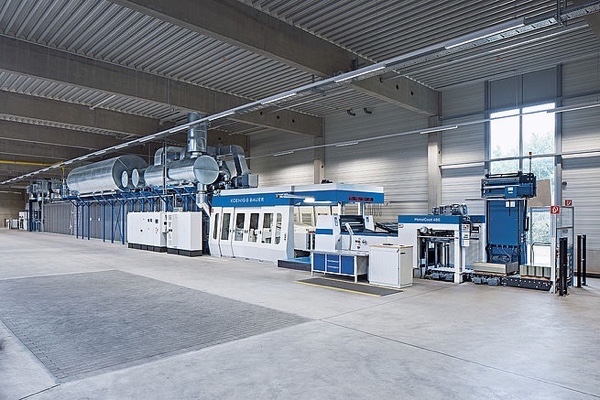Offset Printing
Koenig & Bauer: Saving energy in metal decorating

Thursday 23. June 2022 - Metal decorating is an exacting industry sector with a high energy consumption. The drying ovens that every coated metal sheet must pass through are primarily heated with gas. When it comes to saving energy and purifying exhaust air, Koenig & Bauer MetalPrint has consistently pursued every available opportunity and developed numerous solutions.
Saving energy is one of the most pressing challenges of our time. The spiralling gas prices, in particular, are driving production costs to previously unknown heights for many companies.
Against this background, Koenig & Bauer MetalPrint offered its customers a webinar on ways to reduce their consumption of gas. The level of participation and feedback after the three online sessions was overwhelming.
Metal decorating is an exacting industry sector with a high energy consumption. The drying ovens that every coated metal sheet must pass through are primarily heated with gas. When it comes to saving energy and purifying exhaust air, Koenig & Bauer MetalPrint has consistently pursued every available opportunity and developed numerous solutions over the years. Back in 1974, for example, it introduced integrated exhaust air purification, and developments culminated in the HighEcon exhaust air purification system in 2009. The HighEcon drying oven, which was launched in 2014 with a newly developed KXB burner, picked up a coveted METPACK Innovation Award that year, not least for its enhanced efficiency allowing gas cost savings of up to 70 per cent compared to older systems.
When solvent-based coatings are dried, the solvent-laden air passes through a thermal oxidiser system. With integrated systems such as the HighEcon or EcoTNV drying ovens, the exhaust air is not only purified, but also used to generate heat for the drying process. The solvent in the exhaust air can thereby be exploited to save energy. If the solvent concentration in the air is high enough, gas consumption can be reduced to an absolute minimum.
Best practice examples to illustrate the potential
The webinar presenters Olga Martin and Dominik Wewior illustrated the possibilities for reducing energy consumption by using a number of best practice examples. Customers can complete a questionnaire to obtain a precise gas consumption calculation for their specific application. Where an older system is still in use, the savings potential of an upgrade to a new system is highlighted.
The energy demand of an existing system can be optimised through intelligent organisation of the production process or by raising productivity. The factors influencing gas consumption were compiled and described for the various drying oven models on the market. Practical implementation was explained by way of examples.
Savings can also be achieved in relation to other energy sources when the exhaust air from the drying oven is used for heat recovery. The approx. 200 °C hot exhaust air can pass through an air/water heat exchanger, for example to heat or cool the company offices, to produce hot water or for the energy-efficient cooling of production lines. Integration into a district heating network is also possible. Koenig & Bauer MetalPrint is currently consolidating its partnerships in this field in order to be able to offer customers individual solutions.
Alternatives to natural gas
The webinar also addressed alternatives to natural gas. Faced with increasing gas prices and uncertainty regarding the reliability of an adequate supply, some customers are looking for alternatives in order to escape dependency risks. Generally speaking, it is indeed feasible to heat the drying oven with other fuels such as LPG, biogas or hydrogen. In this regard, suitable sources of energy were presented, and their individual benefits and drawbacks were highlighted.
The customer response was very good. The team at Koenig & Bauer MetalPrint will now be offering individual advice and suitable retrofits to support the industrys energy saving plans.
